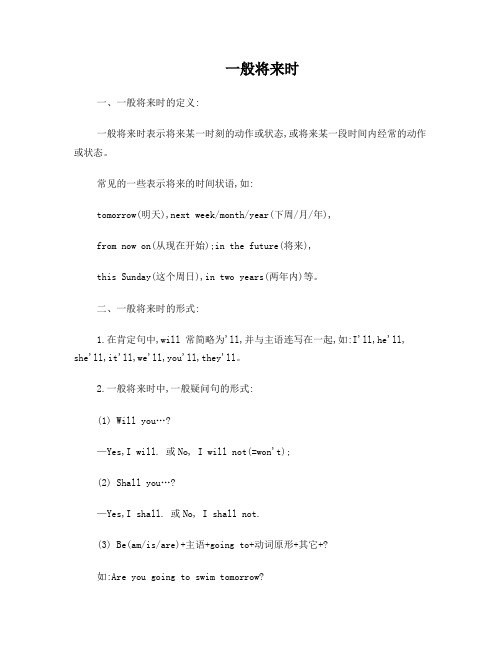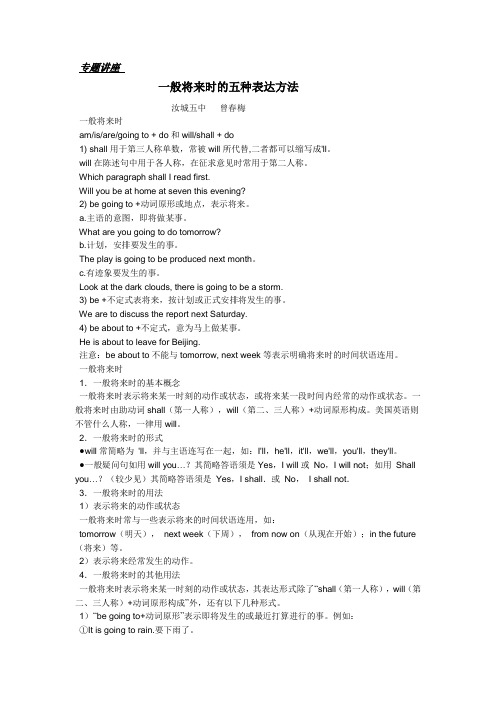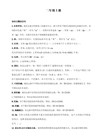般将来时的时间状语
一般将来时时态用法讲解

⼀般将来时时态⽤法讲解⼀般将来时时态1. ⼀般将来时的定义⼀般将来时表⽰在现在看来即将要发⽣的动作或存在的状态。
常⽤时间副词tomorrow, soon或短语next year / week / month, in a few days, in the future, sometime 做状语。
如:What will you do this afternoon?你今天下午⼲什么?We will have a meeting tomorrow. 我们明天要开会。
He is going to study abroad(到国外) next year. 明年他要出国学习。
2. ⼀般将来时的结构及应⽤(1) shall / will + 动词原形。
表⽰即将发⽣的动作或存在的状态。
特别是表⽰客观性的事情或在某条件下要发⽣的事情,只能⽤此结构。
如:What shall we do if he doesn’t come 如果他不来,我们该怎么办?Will you be free this evening 今天晚上有空吗?I think he will tell us the truth(真相)。
我想他会告诉我们真实情况的。
(2) be going to + 动词原形。
表⽰已经计划或安排好了的事情,也可表⽰有迹象表明肯定要发⽣的事情。
如:We are going to have a meeting to discuss (讨论)the matter this evening. 今天晚上开会讨论这件事情。
Look at the black clouds over there. I think it is going to rain soon. 看⼀看那边的乌云,我想天要下⾬了。
There is going to be an English evening this week. 本周要举⾏⼀个英语晚会。
(3) be +现在分词。
一般将来时态

一般将来时讲解一、概念:表示将要发生的动作或存在的状态及打算、计划或准备做某事。
二、时间状语(标志词):tomorrow, next (day,week, month, year…),the day after tomorrow(后天)in ten years 等。
三、基本结构:1.主+be going to + do; 2.主+will+ do.四、区别be going to:(1)表示事先经过考虑、安排好打算要做的事情。
E.g What are you going to do today? 今天你们打算做什么?(2)表示根据目前某种迹象判断,某事非常有可能发生。
Look! There come the dark clouds. It is going to rain.will:(1)表示单纯的未来,将要做的事Eg:I will go home tomorrow.(2)表示不以人的意志为转移的自然发展的未来的事。
He will be thirty years old this time next year.(3)will还可表意愿。
问对方是否愿意做某事或表示客气地邀请或命令。
eg:Will you please turn on the radio?Will you go to the zoo with me?四、否定句:1.主+be(am, is, are)not going to do; 2.主+will not(won’t) do 如:It will not rain.I am not going to go shopping tomorrow.四、疑问句: be或will提到句首 ,第一二人称互换。
(1)一般疑问句:will+主+do/be(am,is,are)+主+going+to doEg:Will you do ……Will there be……(2)特殊疑问句:特殊疑问词+一般疑问句Eg:what are you going to do?**if从句与将来时态的联系:主句用一般现在时态,if从句用一般将来时态。
一般将来时

一般将来时一、一般将来时的定义:一般将来时表示将来某一时刻的动作或状态,或将来某一段时间内经常的动作或状态。
常见的一些表示将来的时间状语,如:tomorrow(明天),next week/month/year(下周/月/年),from now on(从现在开始);in the future(将来),this Sunday(这个周日),in two years(两年内)等。
二、一般将来时的形式:1.在肯定句中,will 常简略为'll,并与主语连写在一起,如:I'll,he'll, she'll,it'll,we'll,you'll,they'll。
2.一般将来时中,一般疑问句的形式:(1) Will you…?—Yes,I will. 或No, I will not(=won't);(2) Shall you…?—Yes,I shall. 或No, I shall not.(3) Be(am/is/are)+主语+going to+动词原形+其它+?如:Are you going to swim tomorrow?—Yes, I am./ No, I'm not.Is he/she going to play football next weekend?—Yes, he/she is./ No, he/she isn't.Are they going to go shopping this Sunday?—yes, they are./ No, they aren't.三、一般将来时的用法:1.一般将来时由“助动词shall(用于第一人称),或者will(用于第一、二、三人称)+动词原形”构成。
这种将来意义常常夹杂着情态意义即带有说话人的主观态度和看法,比如表示“预见”。
有时也含有“意愿”或“意图”的意思。
一般将来时的五种表达方法

专题讲座一般将来时的五种表达方法汝城五中曾春梅一般将来时am/is/are/going to + do和will/shall + do1) shall用于第三人称单数,常被will所代替,二者都可以缩写成'll。
will在陈述句中用于各人称,在征求意见时常用于第二人称。
Which paragraph shall I read first.Will you be at home at seven this evening?2) be going to +动词原形或地点,表示将来。
a.主语的意图,即将做某事。
What are you going to do tomorrow?b.计划,安排要发生的事。
The play is going to be produced next month。
c.有迹象要发生的事。
Look at the dark clouds, there is going to be a storm.3) be +不定式表将来,按计划或正式安排将发生的事。
We are to discuss the report next Saturday.4) be about to +不定式,意为马上做某事。
He is about to leave for Beijing.注意:be about to不能与tomorrow, next week等表示明确将来时的时间状语连用。
一般将来时1.一般将来时的基本概念一般将来时表示将来某一时刻的动作或状态,或将来某一段时间内经常的动作或状态。
一般将来时由助动词shall(第一人称),will(第二、三人称)+动词原形构成。
美国英语则不管什么人称,一律用will。
2.一般将来时的形式●will常简略为'll,并与主语连写在一起,如:I'll,he'll,it'll,we'll,you'll,they'll。
一般将来时 时间状语 later

一般将来时时间状语 later一般将来时,是时间概念中的一种时态,在中文语境中常常用时间状语 later 来加以确定。
在英语中,一般将来时表示将来某个时间要发生的动作或存在的状态,而 later 作为时间状语,用来具体说明这个将来的时间。
在学习一般将来时时,我们通常会注意以下几点。
首先是一般将来时的构成:主语 + will/shall + 动词原形。
其次是一般将来时的用法:表示将来的某个时间要发生的动作或存在的状态。
再次是时间状语的运用,如 later 就是其中一个常见的时间状语。
通过对这些内容的理解,我们可以更深入地掌握一般将来时的用法以及时间状语的作用。
对于一般将来时的构成,我们需要注意主语与 will 或 shall 之间的搭配,以及动词原形的使用。
在构成句子时,我们需要确保主语和谓语动词的一致性,同时也要注意将来时态的助动词will 或shall 的使用。
在句子 "I will travel to London later." 中,主语 I 搭配 will,动词travel 使用原形,符合一般将来时的构成规则。
另外,一般将来时的用法是用来表示将来某个时间要发生的动作或存在的状态。
这意味着当我们需要表达将来的某个时间点或一段时间内会发生的事情时,就可以运用一般将来时。
“I will finish my homework later.” 这句话中,表达了某个时间点之后会完成作业的动作,符合一般将来时的用法。
我们要关注时间状语的运用,其中 later 就是一个常见的时间状语。
时间状语用来说明动作发生的时间,而 later 则表示在未来的某个时间之后。
在句子中使用 later 可以帮助我们更具体地确定动作发生的时间,加强语句的时态和语境。
一般将来时和时间状语 later 的结合运用,可以让我们更准确、清晰地表达将来的动作或状态。
通过对一般将来时的构成、用法和时间状语的理解,我们可以更好地运用这一时态,丰富语言表达的维度,使句子更具有深度和广度。
一般将来时讲解(附习题+答案)

一般将来时讲解(附习题+答案)一、一般将来时的含义:表示动作发生在将来二、一般将来时的句型:(1) will/shall+动词原形(2) be going to+动词原形三、一般将来时的时间状语:tomorrow(明天)、the day after tomorrow(后天)、next...(下一...): next week(下一周)、next year(明年)、next month(下个月)in+一段时间(...之后): in three days(三天之后)、in the future在未来this evening(今天晚上)四、一般将来时的句型结构:(1) will/shall+动词原形(will not =won’t)(will 各种人称均可用,shall 只能用于第一人称)1)肯定句:主语+will/shall+动词原型...如:I will go to school tomorrow.我明天将会去学校He will go to school tomorrow.他明天将会去学校。
2)否定句:主语+will/shall+not+动词原型...如:I won’t go to school tomorrow.我明天将不会去学校。
He won’t go to school tomorrow.他明天将不会去学校。
3)一般疑问句:Will/Shall +主语+动词原型...如:Will you go to school tomorrow?你明天要去学校吗?Will he go to school tomorrow?他明天要去学校吗?肯定回答:Yes, 主语+will.如:Yes, I will.Yes, he will.否定回答:No,主语+will+not.如:No, I won’t.No, he won’t.4) 特殊疑问句:特殊疑问词+will/shall+主语+动词原型...如:What will you do tomorrow?你明天将会做什么?What will he do tomorrow?他明天将会做什么?(2) be going to+动词原形1)肯定句:主语+be going to +动词原型...如:I am going to buy some books tomorrow.我明天打算去买一些书。
六种常用一般将来时表示法

——No, he will not.不,他不会。
注意:在书面语中,主语是第一人称I(We)时,常用shall,即I(We)+shall+动词原形,也可用will。
例如:Shall we have any class tomorrow?明天我们有课吗?
——Yes,we will(we shall).是的,我们明天有课。
10. She_____(have)a concert the next year.
Keys:1、will…arrive 2、will be 3、am going to buy 4、are to 5、will not take
6、has, will go 7、come 8、returns, will let 9、will send, are 10、will have
一、常用表示法:
1、be going to+动词原形
表示将要发生的事,或打算、计划、决定要做的事情时,其肯定式:主语 + be + gong to do ;
疑问式:be + 主语 + gong to do ;否定式:主语 + be + gong to do。其中:be(am/is/are) 随主语人称而变化。
将来时的几种表达方式

一般将来时的几种表达方式一般将来时表示将来某个时间要发生的动作或存在的状态,也表示将来经常或反复发生的动作,常与表示将来的时间状语连用。
例如:tomorrow , tomorrow morning / afternoon …, the day after tomorrow , next year , next month …, from now on (从现在开始),in an hour (一小时后),in two days / weeks …等。
一般将来时的表示方法有以下多种形式:1. will / shall(1) will/shall do表示将来时间时,一般要与表示将来的时间状语连用,或通过一定的上下文来体现将来时间状语。
s hall只用于第一人称,will可以通用于各种人称。
在问句中shall常用于第一人称表示建议或征求对方意见。
例如:A. I shall write you a letter next month .我下个月给你写信。
B. He will come.他会来。
C. Shall we go to the park ?我们去公园好吗?注意:在You and I…或Both of us之后通常用will而不用shall,例:Both of us will be at the meeting tomorrow.明天我们俩都会出席会议。
(2) will/shall be doing因为在will/shall do中的will/shall也可理解为情态动词,所以有时会难区分它们是将来意义还是情态意义。
在英语口语中我们常用will/shall be doing来表示“单纯的”将来时间。
比较下列句子:I will come tomorrow.Will you come?我明天来!你来吗?(will表示意图和请求)I will be coming tomorrow.Will you be coming?我明天来,你来吗?(will在句中单纯表示将来)这一结构还表示不久或势必要发生的动作,例:The train will be arriving soon.火车很快就到站了。
